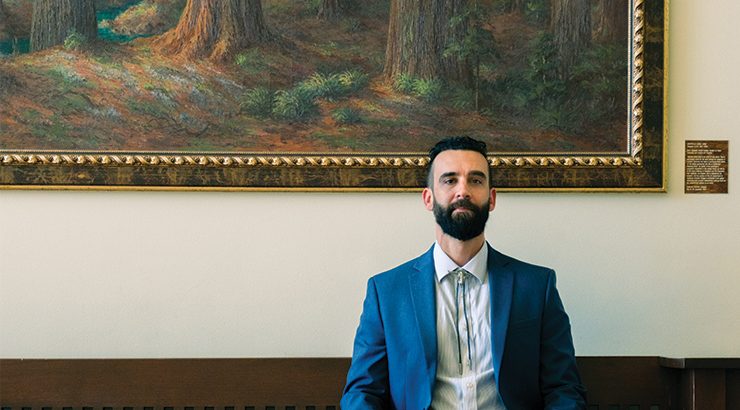
Alumni on the Move: Bobby Waltman
August 30, 2024
Bobby Waltman’s (JD’12) passion for justice, public defense and personal injury practice began when he was just seven years old. Other kids his age might have loaded up on cartoons and MTV, but Bobby Waltman spent his couch time curled up next to his father, watching Sub Rosa VHS tapes as his dad prepared cases as a worker’s compensation representative for the Fremont Insurance company. In time, the VHS video tapes became law books, and Bobby watched with admiration as his father tackled a part-time law degree while supporting his family and honing the same passion for social justice and the law that Bobby Waltman would one day inherit, champion, and build his law career around. By the time he got to college, a career in law was almost a fait accompli. Still, graduating a semester early from his undergraduate degree in Environmental Studies at the University of California Santa Barbara, Waltman found himself living out of his van and playing keyboards in a band called Boombox Orchestra.
“I chose the Van Life for a time,” he says, “while I wouldn’t equate this experience with the struggles faced by those who are unhoused, it gave me a profound appreciation for the challenges that homeless individuals endure.” Living out of his van in Santa Barbara became an experience that would go on to inform both his understanding of the condition of homelessness and imbue him with a deep empathy for unhoused individuals as a public defender, instilling in him a desire to help this often misjudged and underserved group. If there was ever any doubt about pursuing a career in law, it was put to bed after his undergraduate studies, and Waltman soon gave up his adventures in the van for a home at Chapman Law.
At Chapman, Waltman found academic direction and career mentorship in the form of Professor Scott Howe, “Just being in Scott Howe’s classroom continually confirmed that being a public defender was what I wanted to do,” he adds, “Professor Howe made time for me–not to talk about stuff in class–but to talk about his life as a PD. He had been [a public defender] before he was a teacher, and he helped show me what the job takes and what it was all about.”
Waltman was introduced to public defender Adam Vining at a Chapman Law Review symposium and wasted little time sharing his goal of becoming a PD after graduating. Impressed with young Waltman’s conviction, Vining helped him secure an externship at the Orange County Public Defender’s Office. Waltman was immediately drawn to the Collaborative Courts and was allowed to extern in Homeless Court and Drug Court, where he says the fit felt right, “After that first summer, I was convinced,” shares Waltman, “Man, I still miss it!”
As if law school wasn’t tough enough, Waltman’s hero and inspiration for his career in law, his father, passed away from a protracted illness just as Waltman was settling into the Fall semester of his 2L year. A devastating personal blow for Waltman, this setback affected them deeply, and he was forced to take a semester away from law school to manage overwhelming grief and to reevaluate things with a complete change of scenery. A longtime nature-lover, Waltman secured an internship with the Alaska Public Defender Agency in Juneau and chose to live in a tent at a long-term campground half a mile from town.
Time away in Juneau brought Waltman back to brass tacks. He recalls being awed by the immensity of the open space of Alaska, learning a new way of living around bears in the woods, and finding a new set of friends, some as downtrodden as those he had met during his first taste of van life in Santa Barbara. In Juneau, Waltman found a sense of community in the unfamiliar, making unlikely connections and befriending locals, travelers, and fellow campers at a local shelter named “The Glory Hole” [recently renamed “Glory Hall”].
Ultimately, Waltman returned to law school a little more at peace and just as determined to become a public defender. However, he would return to the vastness of Alaska again, serving another externship in the Alaskan Public Defender Agency after he took the bar exam.
“I wanted to finish the job my Dad started but didn’t have a chance to complete–his dream became mine. He used to talk to my sister and I about social justice and how public defenders play an integral role in advocating for the indigent,” adds Waltman, reflecting on his father’s illness that began soon after passing his own bar exams when Bobby was twelve years old.
“In Alaska,” Waltman reflects, “you’re talking about where you found the ripe berries this morning and what animals you saw; there’s a different sense of community there,” he says. Ultimately, this community helped Bobby Waltman begin to heal after his father’s passing. He fondly describes one local, Romeo, an local wolf who had adopted the town and had become something of a mascot for Juneau.
“He would appear around the Mendenhall Glacier when folks were out walking their dogs, and he’d play with them, you know?” Waltman recalls warmly, taking time to remind me of the gulf in scale between a wild wolf and a domesticated dog. It is with great sadness that Waltman recalls a difficult case during his time externing in the Alaska Public Defender’s Office, “A guy went out one day and shot Romeo dead, just to use his body for bear bait,” he finishes abruptly. “I think of that case often,” he adds, “the entire town came out for that sentencing; we all carried that grief; each one of us felt Romeo’s passing deeply.” For Waltman, at least, there’s a guiding thread drawn by the law that leads the way through both a particularly private as well as a shared and public sense of loss.
“Being a public defender isn’t an easy job,” Bobby Waltman comments on the eight years he spent in the Public Defender’s office. Starting with misdemeanors, he moved up to felonies and gradually moved into representing parents whose parental rights were at issue in Dependency Court. In Boys Court, Waltman relished his role, working with teenage boys who had wound up in the system and desperately needed extra support. Working closely with a social worker, Bobby became something of a big brother and mentor to them, taking them hiking, accompanying them to breakdancing competitions, and other healthy social engagements; he takes pride in adding that he is still in touch with a few of the youths he aided over the years.
Working as “a PD” was a high-stress role for Waltman, who had begun to think about starting a family of his own and started to consider a career path that would allow him to remain healthy, especially with regard to his own mental health and stress levels. By this stage of his career he was supervising a team of misdemeanor attorneys that he was responsible for motivating and training. Add to this twenty-eight jury trials as first chair as a public defender with a fifty percent acquittal rate, and the volume of stress becomes glaringly obvious. But how does one successfully transition mid-career? Waltman returned to Chapman again, this time to consult with a former Chapman Law legal writing professor, David Finley, who suggested Waltman reach out to a friend and kindred spirit, Ted Wacker of The Law Offices of Ted Wacker, a prompt that gave Waltman a path forward, allowing him to draw on his extensive experience gained in the public defender’s office while still helping people in need of a lifetime of care. Waltman reflects on the move, adding, “The PD’s office is where I shaped my sword; it’s a place where I got trained by incredible lawyers who I hope to emulate in my own practice. I leveraged my experience and skills as a public defender when I transitioned into personal injury law, while maintaining a dedication to treating each client as family, regardless of their perceptions of me.”
Don’t all clients like their lawyers, or appreciate them at the very least? Waltman’s experience comes through as he shakes his head, smiling, “A good lawyer not only goes the extra mile for those clients who like you but also for those who don’t. Public defenders often face challenging clients,” he says, “including those who may resent us, but we still defend them to the fullest with zealous advocacy. My goal was always to treat each client as if they were someone I truly cared about. It’s an approach that I try to bring to my work every day.”
It’s a powerful lesson in compassion and humility from a recent graduate who felt called to the bar in service of those in need. Bobby Waltman remains a sterling example of triumph in the face of adversity and an exemplary advocate for justice, if not just practical evidence, that there may still be a few folks left, tending the light at the end of the tunnel.

